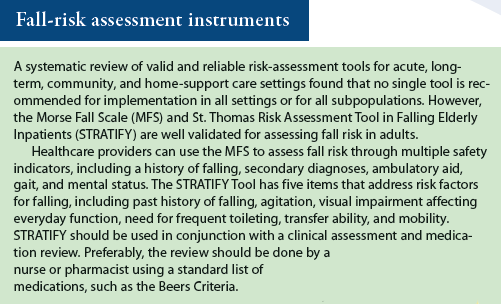Little Known Questions About Dementia Fall Risk.
Little Known Questions About Dementia Fall Risk.
Blog Article
The Buzz on Dementia Fall Risk
Table of ContentsDementia Fall Risk Things To Know Before You BuyThe Best Guide To Dementia Fall RiskThe 2-Minute Rule for Dementia Fall RiskDementia Fall Risk Things To Know Before You BuyAll about Dementia Fall Risk
Examining fall risk assists the entire medical care team establish a much safer atmosphere for each client. Guarantee that there is a marked location in your medical charting system where personnel can document/reference scores and record relevant notes associated to fall avoidance. The Johns Hopkins Loss Danger Assessment Device is just one of numerous devices your staff can make use of to help avoid unfavorable clinical events.Client drops in medical facilities are usual and devastating negative occasions that linger regardless of years of effort to decrease them. Improving communication across the evaluating nurse, care team, client, and client's most included loved ones might reinforce autumn avoidance efforts. A group at Brigham and Female's Healthcare facility in Boston, Massachusetts, looked for to create a standardized loss prevention program that focused around improved communication and client and family involvement.

The innovation team stressed that successful application depends upon person and staff buy-in, combination of the program right into existing process, and fidelity to program processes. The group kept in mind that they are facing exactly how to make sure continuity in program implementation during durations of crisis. Throughout the COVID-19 pandemic, for instance, a rise in inpatient falls was connected with limitations in patient engagement along with limitations on visitation.
The Facts About Dementia Fall Risk Uncovered
These cases are typically taken into consideration preventable. To apply the intervention, companies require the following: Access to Loss TIPS sources Fall suggestions training and retraining for nursing and non-nursing staff, consisting of brand-new nurses Nursing process that enable for person and family members interaction to perform the drops analysis, make sure use the avoidance strategy, and conduct patient-level audits.
The outcomes can be very destructive, frequently increasing client decline and triggering longer health center keeps. One research study approximated stays raised an added 12 in-patient days after an individual autumn. The Fall TIPS Program is based on appealing people and their family/loved ones across three primary processes: analysis, individualized preventative interventions, and bookkeeping to ensure that individuals are involved in the three-step autumn avoidance procedure.
The person analysis is based on the Morse Loss Scale, which is a validated autumn threat assessment device for in-patient hospital setups. The scale consists of the 6 most typical factors patients in health centers drop: the person fall background, risky conditions (consisting of polypharmacy), use IVs and various other exterior gadgets, mental condition, gait, and wheelchair.
Each threat factor web links with one or more actionable evidence-based treatments. The nurse creates a plan that integrates the treatments and is visible to the care team, person, and family members on a laminated poster or printed aesthetic aid. Registered nurses establish the plan while meeting the patient and the client's family members.
The 2-Minute Rule for Dementia Fall Risk
The poster functions as an interaction tool with other participants of the individual's treatment team. Dementia Fall Risk. The audit part of the program consists of analyzing the client's expertise of their risk variables and avoidance plan at the unit and health center degrees. Registered nurse champs carry out a minimum of 5 individual interviews a month with patients and their households navigate to this website to look for understanding of the autumn avoidance strategy

A projected 30% of these falls cause injuries, which can vary in extent. Unlike other adverse occasions that need a standardized clinical response, fall prevention depends extremely on the demands of the person. Including the input of people who know the client finest enables better modification. This approach has proven to be more efficient than fall avoidance programs that are based mostly on the manufacturing of a danger score and/or are not personalized.
The Buzz on Dementia Fall Risk

Based on bookkeeping results, one website had 86% compliance and 2 sites had over 95% compliance. A cost-benefit evaluation of the Loss suggestions program in 8 medical facilities estimated that the program price $0.88 per individual to implement and resulted in financial savings of $8,500 per 1000 patient-days in direct expenses associated with the avoidance of 567 investigate this site drops over 3 years and 8 months.
According to the development team, organizations thinking about applying the program must conduct a preparedness evaluation and falls prevention spaces evaluation. 8 In addition, organizations ought to ensure the necessary framework and workflows for execution and create an execution strategy. If one exists, the company's Fall Avoidance Task Force should be associated with planning.
The Ultimate Guide To Dementia Fall Risk
To start, organizations need to make sure conclusion of training components by registered nurses and nursing assistants - Dementia Fall Risk. Medical facility staff need to assess, based upon the requirements of a healthcare facility, whether to use a digital wellness document printout or paper variation of the autumn prevention plan. Carrying out teams ought to hire and educate nurse champs and develop processes for bookkeeping and reporting on loss data
Personnel require to be entailed in the look at here now process of revamping the workflow to engage patients and family members in the evaluation and prevention strategy procedure. Systems must remain in location so that units can comprehend why an autumn happened and remediate the cause. Extra particularly, registered nurses need to have channels to supply ongoing feedback to both staff and unit management so they can readjust and boost loss prevention operations and connect systemic problems.
Report this page